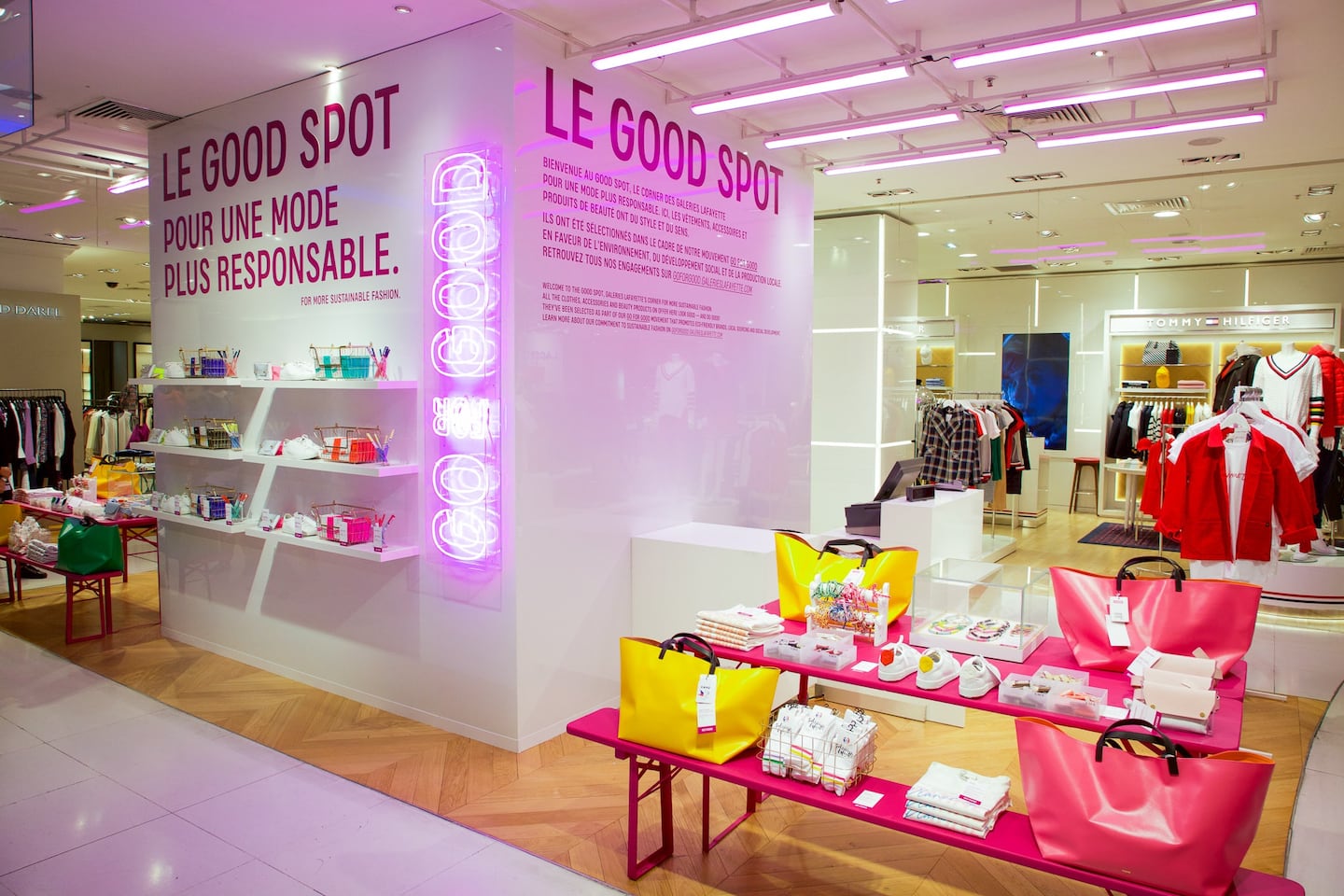
The Business of Fashion
Agenda-setting intelligence, analysis and advice for the global fashion community.

Agenda-setting intelligence, analysis and advice for the global fashion community.

LONDON, United Kingdom — When Maggie Hewitt first began shopping her sustainable fashion brand Maggie Marilyn to wholesalers in 2016, few buyers were interested in hearing about her efforts to make clothes in an eco-friendly and socially responsible way.
Now, many retailers demand that information upfront. From an initial exclusive collection at Net-a-Porter, the brand is now stocked at around 75 retailers globally, with some showing more interest in the sustainable aspects of her designs, and others focusing purely on the fashion.
“The tide is changing,” Hewitt said. "Designers can ... implement social and environmental transparency, but ultimately, if the retailers don't get behind [them], change won't happen quickly enough. I feel excited that some retailers are really starting to listen."
A host of department stores and e-commerce sites are jumping onboard the sustainability boom. Selfridges says 50 percent of the products it sells will be better for people and the planet by 2022, and Galeries Lafayette showcases products that meet certain environmentally or socially-positive criteria. Farfetch hired its first head of sustainability last year, and Net-a-Porter is preparing to launch a series of sustainability initiatives later in 2019.
ADVERTISEMENT
The fact that retailers are spotlighting sustainable brands is adding fuel to a small but emerging segment of the market. German e-tailer Zalando estimates that just 1 percent of the market is currently made up of sustainable fashion, but it is actively hunting for ways to expand its offering. As brands scramble to find ways to distinguish themselves in an intensely competitive market, the prospect of additional promotion from major retailers could provide a significant push towards more sustainable practices.
These will have better visibility in our stores, so it's in [brands'] interest to develop more and more sustainable products.
“We’re saying; ‘we will select more and more sustainable products over the years,’” said Damien Pellé, head of sustainability at Galeries Lafayette. “These will have better visibility in our stores, so it’s in [brands’] interest to develop more and more sustainable products.”
Of course, retailers' motivations aren't entirely altruistic. Sustainability is potentially big business and a growing body of evidence shows embracing the concept can draw in younger customers. According to BoF and McKinsey & Company's 2019 State of Fashion report, nine out of 10 Generation Z consumers believe companies have a responsibility to address environmental and social issues, while fashion search engine Lyst saw a 66 percent increase in searches for sustainable fashion last year.
“It’s an emerging demand,” Pellé said. “We try to anticipate it because we bet it will arise very quickly over the next few years.”
The French luxury retail chain’s initiative called Go for Good launched last year and features products that are made in socially or environmentally responsible ways. The Galeries Lafayette website has a special area where consumers can find products and brands that meet the initiative's criteria, and the retailer’s flagship store on Paris’s Boulevard Haussmann hosts a concept store and café to showcase sustainable goods.
Products under the Go for Good label have sold well, and 85 percent of customers surveyed by the retailer said they supported the initiative and would like to see it do more. Over time, Pellé said the retailer will tighten the requirements for a product to qualify for the initiative, but at present only around 5 percent of its products measure up. “We are just at the beginning,” he said.
Elsewhere, Selfridges found sales of refillable bottles soared after it banned single-use plastic water bottles, and its recent week-long Bright New Things showcase of new sustainable brands attracted nearly 15,000 views on the Selfridges website, as well as an increase in customer interaction of more than 100 percent year-on-year.
To be sure, retailers’ engagement with issues of sustainability vary widely across the industry, and for many, it’s still early days. A recent report by a UK parliamentary committee called out retailers like Amazon UK and Boohoo Group for not doing enough to tackle “unsustainable” and “exploitative” industry practices. Boohoo has said the report’s findings don’t fully reflect its commitment to sustainability, while Amazon declined to comment.
ADVERTISEMENT
It's also not the first time retailers have flirted with sustainable commitments. It was an active conversation in the late 2000s that got derailed by the recession, but things have moved on since then, with climate change becoming a much more pressing social and political topic.
"We're deep into it now," said fashion consultant Julie Gilhart. "There's a more consistent conversation."
While there's certainly still room for improvement, a growing band of retailers are looking at ways to engage further with the issues, making moves that could force more substantive changes among the brands they stock.
In addition to promoting brands and products that have been made in a socially and environmentally responsible manner, they are working to reduce their own environmental footprints and putting stricter requirements on the brands they stock.
Asos launched a programme last January to work with its more than 1,000 third-party brands to ensure they meet the retailer’s minimum requirements for ethical trade and sustainability. By 2020, it expects all the brands sold on the Asos website to have an ethical trade policy, transparency around their direct suppliers and to comply with relevant chemical regulations in all the countries where Asos retails. Where relevant, brands are also expected to have an animal welfare policy, and those operating in the UK are expected to publish a Modern Slavery Statement.
The initiative provides brands with training and support in putting together their compliance programmes, and requirements are expected to become more stringent over time. Asos has said its goal is to drive “a systemic shift in the way brands approach ethical trade and sustainability.”
Elsewhere, Harvey Nichols is looking at ways to rework its legally binding code of conduct to make it more rigorous. It already blacklists brands it finds are non-compliant with its standards for working conditions and governance.
We have to be out there talking to our brands, saying this is what we believe in.
“We have to be out there talking to our brands, saying this is what we believe in,” said group marketing and creative director Deborah Bee. “Customers expect it of us, and if we fail, they will lose trust in us.”
ADVERTISEMENT
Of course, retailers’ primary consideration is still whether a product looks good and will appeal to their consumer base.
“The key purchasing drivers haven’t changed; consumers are still looking for style, for quality, for value for money,” said Tom Berry, global director of sustainable business at Farfetch. But brands that deliver all that, and have a story to tell about sustainability, can prove enticing. “There is definitely a growth opportunity and business opportunity there,” Berry said.

A recent pop-up of sustainable brands from the Maiyet Collective at Harvey Nichols | Source: Courtesy
Initiatives linked to sustainability also offer potential new revenue streams. For instance, long term, Farfetch is looking at opportunities around rental. It sees significant potential in re-sale and plans to expand its vintage offering.
“Re-sale (and take-back) is a really interesting part of this as it's growing so fast,” Berry said in an email. “We are exploring opportunities about how we take an even more active role in that particular market in the future.”
As retailers step up their efforts they will have to walk a delicate line, engaging with skeptical consumers on a sensitive subject and balancing sustainability initiatives against business needs.
“You have to have a certain humility because we are not going to become a sustainable company overnight,” said Harvey Nichols’ Bee. “You have to do what’s right in principle, and what’s right for the environment, and what’s right for the workforce, and it’s a balancing act.”
Related Articles:
[ The New Rules of Brick-and-Mortar RetailOpens in new window ]
[ Building a Sustainable Brand: How to Get StartedOpens in new window ]
[ Making the Business Case for SustainabilityOpens in new window ]
The outerwear company is set to start selling wetsuits made in part by harvesting materials from old ones.
The trial of Colombian designer Nancy Gonzalez for smuggling alligator and snakeskin handbags into the US shone a rare public spotlight on the trade in the exotic skins used for some of fashion’s most expensive and controversial products.
Europe’s Parliament has signed off rules that will make brands more accountable for what happens in their supply chains, ban products made with forced labour and set new environmental standards for the design and disposal of products.
Fashion’s biggest sustainable cotton certifier said it found no evidence of non-compliance at farms covered by its standard, but acknowledged weaknesses in its monitoring approach.